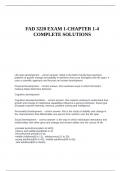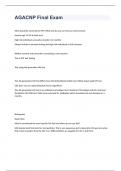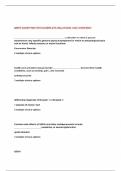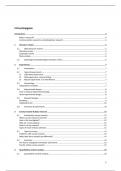Misrepresentation
Two types of obligations that are imposed by the courts upon contracting parties
Duty to disclose all known material facts to the other contracting party
Duty to refrain from making active misrepresentations: that is to say, a contracting party is not
compelled to disclose information, but once he does disclose, he must do so truthfully.
That being said, a particular duty of disclosure is held to exist in certain cases
A claimant will be prevented from snatching at a bargain which he knew was not intended by the
defendant.
o A seller who knows that the buyer has misunderstood the terms of his offer is under an
obligation to inform the buyer of the true nature of his offer in the sense that the contract will
be set aside on the ground of mistake if he does not disclose
o But where a buyer makes a mistake and that mistake does not relate to the terms of the offer,
then the seller, even if he is aware of the mistake, is not under an obligation to disclose the
mistake to the buyer
Representation by conduct
o While simple reticence does not amount to legal fraud, ‘a nod or a wink, or a shake of the
head, or a smile from the purchases intended to induce the vendor to believe the existence of
a non-existing fact, which might influence the price of the subject to be sold’ would be
sufficient ground for refusing a contract
Representation falsified by later events
o Guilty of misrepresentation where he fails to correct a representation which, when made was
true, but which subsequently, to his knowledge, has become false or which, at the time of
making it he believed to be true, but which he has subsequently discovered to be false.
o A representation, once made, is deemed to be a continuing representation, so that once it
becomes false to the knowledge of the representor and fails to correct it, it becomes
misrepresentation
Statement literally true but misleading
o Misrepresentation because the maker of the statement has failed to disclose all the relevant
information
o The Consumer Protection from Unfair Trading Regulations 2008, Reg 5 ‘if it contains false
information and is therefore untruthful in relation to any of the matters in paragraph (4) or if it
or its overall presentation in any way deceives or is likely to deceive the average consumer in
relation to any of the matters in that paragraph, even if the information is factually correct;
[misleading omissions are prohibited under the Regs, but there is no remedy for a consumer].
Contracts uberrimae fidei (of the utsmost good faith)
o Known has contracts of the utmost good faith
o Eg. Contracts of insurance before the legislations modified it
o ‘Any rule of law permitting a party to a contract of insurance to avoid the contract on the
ground that the utmost good faith has not been observed by the other party is abolished
Fiduciary relationships
Role of the Sale of Goods Act 1979 and the Consumer Rights Act 2015
Ss 14(2) Sale of Goods Act 1979, where a seller sells goods in the course of a business, there is
an implied condition that the goods supplied under the contract are of satisfactory quality, except
in relation to defects drawn to the buyer’s attention before the contract was concluded or, in the
case where the buyer examines the goods, as regards defects which the examination ought to
reveal
, S.14(3) Sale of Goods Act 1979 - Where the seller sells goods in the course of a business and the
buyer makes known to the seller any particular purpose for which the goods are being bought,
there is an implied condition that the goods supplied under the contract are reasonably fit for that
purpose.
The existence of the satisfactory quality and fitness for purpose provisions mitigates the hardships
which would otherwise be caused by the refusal of English contract law to recognize the
existence of general duty of disclosure
Distinction between a promise and a representation
A promise may be defined as a statement by which the maker of the statement accepts or appears
to accept an obligation to do or not to do something
A representation is a statement which simply asserts the truth of a given state of facts. It is a
statement of fact which induces the other party to enter into a contract or otherwise act to his
detriment
Types of misrepresentation
Fraudulent misrepresentation:
o There must be proof of fraud and nothing short of that is sufficient
o Fraud is proved when it is shown that a false representation has been made (i) knowingly or
(ii) without belief in its truth (iii) recklessly, careless whether it be true or false.
o Unreasonableness of belief does not of itself constitute fraud
o If fraud is proved the motive of the person guilty of it is immaterial
o Damages for tort of deceit
Reliance measure of damages (place claimant in the position as if the statement had
never been made; NOT in the position as if the statement had been true)
BUT: This measure may include damages for lost opportunity (East v Maurer)
No remoteness limitation (Smith New Court Securities)
Punitive damages (rare) (Kuddus)
Negligent misrepresentation
o It is actionable by common law where there is a reasonable reliance by the representee on a
statement made by the representor who is thereby deemed to have assumed responsibility by
the representor
o A key element is the knowledge of the representor at the time at which the statement was
made. The greater the knowledge which the representor has of the representee and of the
purposes of which the representee is likely to rely upon his statement, the more likely it is that
the representor will be held to owe a duty of care to the representee
o The reasonableness of the reliance by the representee is also important
Section 2(1) of the Misrepresentation Act 1967
o Places the burden on the defendant to prove that he had reasonable grounds to believe and
did believe up when the contract was made is true
o Damages assessed as if the misrepresentation was fradulent
Innocent misrepresentation
o Does not fulfil any of the 3 categories above
o Only remedy is rescission and an indemnity
o Unless the court, under Section 2(2) Misrepresentation Act 1967, exercises its discretion to
award damages in lieu of recission
A claim for misrepresentation must include
A representation that is false:
o An unambiguous, false statement of fact or law which is addressed to the party misled, which
is material and which induces a contract
2
Two types of obligations that are imposed by the courts upon contracting parties
Duty to disclose all known material facts to the other contracting party
Duty to refrain from making active misrepresentations: that is to say, a contracting party is not
compelled to disclose information, but once he does disclose, he must do so truthfully.
That being said, a particular duty of disclosure is held to exist in certain cases
A claimant will be prevented from snatching at a bargain which he knew was not intended by the
defendant.
o A seller who knows that the buyer has misunderstood the terms of his offer is under an
obligation to inform the buyer of the true nature of his offer in the sense that the contract will
be set aside on the ground of mistake if he does not disclose
o But where a buyer makes a mistake and that mistake does not relate to the terms of the offer,
then the seller, even if he is aware of the mistake, is not under an obligation to disclose the
mistake to the buyer
Representation by conduct
o While simple reticence does not amount to legal fraud, ‘a nod or a wink, or a shake of the
head, or a smile from the purchases intended to induce the vendor to believe the existence of
a non-existing fact, which might influence the price of the subject to be sold’ would be
sufficient ground for refusing a contract
Representation falsified by later events
o Guilty of misrepresentation where he fails to correct a representation which, when made was
true, but which subsequently, to his knowledge, has become false or which, at the time of
making it he believed to be true, but which he has subsequently discovered to be false.
o A representation, once made, is deemed to be a continuing representation, so that once it
becomes false to the knowledge of the representor and fails to correct it, it becomes
misrepresentation
Statement literally true but misleading
o Misrepresentation because the maker of the statement has failed to disclose all the relevant
information
o The Consumer Protection from Unfair Trading Regulations 2008, Reg 5 ‘if it contains false
information and is therefore untruthful in relation to any of the matters in paragraph (4) or if it
or its overall presentation in any way deceives or is likely to deceive the average consumer in
relation to any of the matters in that paragraph, even if the information is factually correct;
[misleading omissions are prohibited under the Regs, but there is no remedy for a consumer].
Contracts uberrimae fidei (of the utsmost good faith)
o Known has contracts of the utmost good faith
o Eg. Contracts of insurance before the legislations modified it
o ‘Any rule of law permitting a party to a contract of insurance to avoid the contract on the
ground that the utmost good faith has not been observed by the other party is abolished
Fiduciary relationships
Role of the Sale of Goods Act 1979 and the Consumer Rights Act 2015
Ss 14(2) Sale of Goods Act 1979, where a seller sells goods in the course of a business, there is
an implied condition that the goods supplied under the contract are of satisfactory quality, except
in relation to defects drawn to the buyer’s attention before the contract was concluded or, in the
case where the buyer examines the goods, as regards defects which the examination ought to
reveal
, S.14(3) Sale of Goods Act 1979 - Where the seller sells goods in the course of a business and the
buyer makes known to the seller any particular purpose for which the goods are being bought,
there is an implied condition that the goods supplied under the contract are reasonably fit for that
purpose.
The existence of the satisfactory quality and fitness for purpose provisions mitigates the hardships
which would otherwise be caused by the refusal of English contract law to recognize the
existence of general duty of disclosure
Distinction between a promise and a representation
A promise may be defined as a statement by which the maker of the statement accepts or appears
to accept an obligation to do or not to do something
A representation is a statement which simply asserts the truth of a given state of facts. It is a
statement of fact which induces the other party to enter into a contract or otherwise act to his
detriment
Types of misrepresentation
Fraudulent misrepresentation:
o There must be proof of fraud and nothing short of that is sufficient
o Fraud is proved when it is shown that a false representation has been made (i) knowingly or
(ii) without belief in its truth (iii) recklessly, careless whether it be true or false.
o Unreasonableness of belief does not of itself constitute fraud
o If fraud is proved the motive of the person guilty of it is immaterial
o Damages for tort of deceit
Reliance measure of damages (place claimant in the position as if the statement had
never been made; NOT in the position as if the statement had been true)
BUT: This measure may include damages for lost opportunity (East v Maurer)
No remoteness limitation (Smith New Court Securities)
Punitive damages (rare) (Kuddus)
Negligent misrepresentation
o It is actionable by common law where there is a reasonable reliance by the representee on a
statement made by the representor who is thereby deemed to have assumed responsibility by
the representor
o A key element is the knowledge of the representor at the time at which the statement was
made. The greater the knowledge which the representor has of the representee and of the
purposes of which the representee is likely to rely upon his statement, the more likely it is that
the representor will be held to owe a duty of care to the representee
o The reasonableness of the reliance by the representee is also important
Section 2(1) of the Misrepresentation Act 1967
o Places the burden on the defendant to prove that he had reasonable grounds to believe and
did believe up when the contract was made is true
o Damages assessed as if the misrepresentation was fradulent
Innocent misrepresentation
o Does not fulfil any of the 3 categories above
o Only remedy is rescission and an indemnity
o Unless the court, under Section 2(2) Misrepresentation Act 1967, exercises its discretion to
award damages in lieu of recission
A claim for misrepresentation must include
A representation that is false:
o An unambiguous, false statement of fact or law which is addressed to the party misled, which
is material and which induces a contract
2







